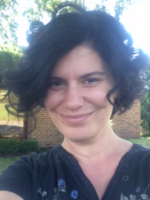Avoid Common Writing Mistakes

Guest blogger: Natalie Hanneman, Freelance Editor
Working with new novelists is one part of my job as a freelance editor that can bring the highest highs and the lowest lows. I am privileged to work with many authors who have never been published, much less edited, and plowing this new territory together is hard work for both of us, but also rewarding.
What I most admire about writers is their courage. It takes someone with fortitude to sit down and write a novel. I recall one author friend saying to me, “Why don’t you write a book, Natalie, you’d be so good at it.” I told her that, unlike her, I don’t have people in my head telling me their life stories. I am not creative in this way. The complexity of novel writing, character building, storytelling…it’s hard work—and it’s an artform.
My creativity shows itself, though, when writing editorial letters. I consider writing editorial letters its own artform, as they, too, have their highs and lows, and if an editor is worth her salt, she’s been strategic with how she’s ordered the letter and diplomatic with her wording.
In this post I want to share some tips addressing the mistakes I most often see from new novelists. By paying attention to these mechanics, your writing will be tighter and your presentation more polished. Writing and revising will still be hard work, but by applying these tips, you and your editor will be able to examine your story at a deeper level because these errors won’t be clouding the language.
- Be concise: say what you have to say in as few words as possible. For example, “After giving his mom an update…” can be shortened to “After updating his mom…”
- Avoid passive voice: It had gotten lost. If you aren’t sure what passive voice is, this website does a great job explaining it.
- Don’t repeat a word in a sentence. These word echoes happen more often than you might think. Many times this happens when the same word is used as two different parts of speech. “I suggested setting a different temperature setting.”
- Attributions are important in dialog, but use them sparingly. If there are two characters talking, you don’t need to have an attribution after each character speaks. Another way to reduce attribution usage is to give your characters unique styles of speaking so that readers know automatically who is talking.
- Here’s a trick I use sometimes. Instead of writing: “I know it’s a lot to ask,” Madison said, checking her teeth in the mirror. Write it this way: “I know it’s a lot to ask.” Madison checked her teeth in the mirror. It’s a small adjustment but it makes it clear who is speaking without tagging on an attribution.
- Just use “said.” When you use attributions, unlike in nonfiction, don’t try to use a variety of words for “said” like “noted”; “spoke”; or “commented.” Fiction readers are reading fast and words like “said” don’t register in their minds. But if you use another word instead of “said,” it creates a little speedbump and they must slow down to actually read the word. Let’s do whatever we can to avoid slowing readers down!
- Sometimes authors share what’s about to happen right before it happens. For example: Rosemary was about to let him have it. “What do you mean you didn’t pick any up for me?” You don’t need that first sentence. Just show Rosemary letting him have it! This will tighten up the scene and increase the pacing.
- Beware of using certain words too often. Authors commonly repeat words such as: chuckled; smiled; or looked. Do a search in your current WIP and see how many times you used the word “laugh.” (Don’t worry, we won’t make you tell us.) I find that each writer has their own pet words they tend to overuse.
- Help the reader keep track of time by adding periodic mentions of the day of the week/month, etc., especially in stories where the timing is important. For example, if the protagonist and hero only have a week together, don’t just let each day run into the next. Related to this, I usually suggest authors write out the timeline of their book. They can put a comment in the manuscript document whenever a new day begins, and if the book doesn’t span many days, then note if it’s morning, lunchtime, afternoon, or evening. You’d be shocked by how many errors an author can avoid or correct by having a written timeline.
- Don’t rehash an event the reader has already experienced. Authors may be tempted to put a conversation on-stage where one character is filling in another character about something that happened, but don’t make the reader sit through it a second time. Instead, have the character summarize what happened. For example: Helen told Michael what happened at the beach.
- Don’t use the words “very” or “really.” Strengthen your adjectives and verbs instead.
Have you worked with an editor? What do you think are your own editorial trouble spots?
 Natalie Hanemann is an award-winning editor who has worked for more than fifteen years in book publishing. In 2012, she left her position as an in-house editor at a book publisher to stay home with her four children and began her freelance editing business.
Natalie Hanemann is an award-winning editor who has worked for more than fifteen years in book publishing. In 2012, she left her position as an in-house editor at a book publisher to stay home with her four children and began her freelance editing business.









Excellent tips. Now to apply them.
Natalie is the best. Whether you are just starting out or have several books out there, I highly recommend her as an editor. She will make your good book great!
What a fantastic article, Natalie! SO many good, actionable tips here. I definitely have tried to be more aware of my own pet phrases. And now I’m noticing them more in other writers’ work. Example: If Ted Dekker talks about gardenia’s one more time, I might have an aneurysm.
And I’m sure if I have another character shake their head, you’ll want to shove your thumbs in your eyes. 🙂
Thank you, Natalie. Although I write non-fiction, excellent fiction-writing principles apply to my genre too.
One of my pet peeves in reading novels is the use of favorite words by an author. Agatha Christie loved “mendacious” and “impassive.” The author of the book I’m currently reading is enamored with “stunning” and “jaw-dropping.”
But I have logs in my own eyes–my editor often finds repeated words in my manuscripts! Sigh . . .
Hi Jeanette, yes! It seems like once you notice it, the author uses it ALL the time! I’m a fan of Philippa Gregory. She’s always writing that her protagonist “rounded” on someone.
I am revising from an editor’s notes this month. She saw a huge flaw I had missed, plus she gave great encouragement. So glad I made the investment.
This post is extremely helpful. I am writing a YA novel. My challenge is writing authentic dialogue.
Thanks for sharing this information!
I’m so glad you found the tips helpful. Dialogue is it’s own little artform, isn’t it?
Great tips. Years ago I read On Writing Well by William Zissner and it made me more sensitive to these sorts of things. Also deepened my appreciation for clear, effective, economical writers like EB White and Hemingway.
Thank you for all the helpful tips! When going through and editing my manuscript these last few times, I’ve noticed that people are laughing and smiling far too often, and that everybody seems to be furrowing their brows for some reason. Oh, well. That’s what continued editing is for.
Again, thank you so much for sharing and helping writers grow and learn more. I appreciate all the advice!
Thank you for these great tips. I’m so thankful for the eye of an editor. So thank you for what you do. (I’m currently in my first publishing experience- I’m very grateful for the patience of my editor. It encourages me to see you write it’s hard work for both of us. I hope they’ll feel it was rewarding at the end too.)